This year is relatively new, but one thing never gets old—the need for a leading job tracker software. Whether you’ve got a to-do list to manage at intervals or you want to know how to schedule shifts, there are multiple work hours trackers, jobs, and project and time tracking software options you can choose from.
Whether you’re running a small business or a large organization, there’s always room for job-track software to maximize how your team works together and the workload. Data from such software helps improve efficiency and produce reliable budgets and reports, among other benefits.
Exploring the Leading Job Tracking Software Solutions
Understanding the attributes that define the best job tracking software is pivotal for optimizing your task management and efficiency choices. Whether you’re an individual aiming to enhance personal productivity or an integral part of a collaborative team, harnessing top-tier job tracking software offers insightful tools for effectively managing your daily, weekly, monthly, and yearly tasks.
Key assessment criteria
Significance in job efficiency: Embracing premier job tracking software empowers you to streamline your workflow, maximizing your time usage and achieving your goals efficiently.
Real-time task tracking: These applications seamlessly initiate, pause, and complete task-tracking features, ensuring precise time allocation and progress monitoring.
Task categorization: Effortlessly organize your tasks into categories for improved organization and focused work.
Collaboration and communication: Access features that foster teamwork, enriching communication and collaboration among team members.
Integration and synchronization: Streamlined functionality that integrates seamlessly with various tools and platforms, ensuring a cohesive and efficient work environment.
User-friendly accessibility: The software ensures easy access and utilization of productivity-enhancing attributes across various devices and platforms.
Our methodology for evaluation and testing
Our assessments are meticulously curated by experienced professionals who specialize in software analysis for job efficiency. Each software application undergoes rigorous testing and scrutiny against our predefined criteria. Importantly, we maintain a strict policy of not accepting compensation for featuring software or incorporating it into our articles. Our primary focus is on preserving the trust our readers have in our impartial and authentic software assessments, designed to elevate productivity and task management across diverse scenarios.
What is a Job Tracking App & Why Use It?
A job tracker software is designed to monitor the progress of every project. Some of its processes include working with updated time concerning employee tasks and the steps taken to achieve them. With such software, it’s easy to track insights while organizations learn to handle workflows to boost efficiency and output better.
Tracking software at work promotes transparency and smooth operations. As a result, every stakeholder, manager, and employee is responsible for their roles and the project’s current status. Further, it creates accountability for teams, thanks to employee time-tracking capabilities. Here are some of the several important reasons you should use job tracking software in 2023.
⏰ Streamlined workflows and processes
You can overcome bottlenecks in different tasks and processes because job-tracking software allows you to eliminate potential roadblocks before they happen. Through that, your organization saves time, money, and other resources.
💸 Optimize your budget
When there’s no clear budget, it’s easy to make projections and estimates that hurt your finances in the long run. However, you can end the speculations by optimizing your budget with work tracker software.
The software provides real-time insight into the costs of each project and the steps involved. You get comprehensive data on your project’s direction and ways to stay within your budget.
🕵️♀️ Transparency and visibility
With a job tracking system in place, everyone in your company will know who is assigned to a particular team and where they are so far. Key stakeholders can use this information to map out projects, their time frames, and how best to optimize employee skills.
👌 Judicious use of resources
Resources come in different forms. For many businesses and organizations, data derived from work management platforms help them utilize resources efficiently. Knowing what to allocate to different projects is easier when you clearly understand how resources are used. Nothing goes to waste with top job tracking software.
14 Best Job Tracking Apps
When searching for the best job trackers, you can’t just hook up any app and go. Here are 14 proven apps to help you make a difference in your organization.
1. Everhour – Best software for job tracking
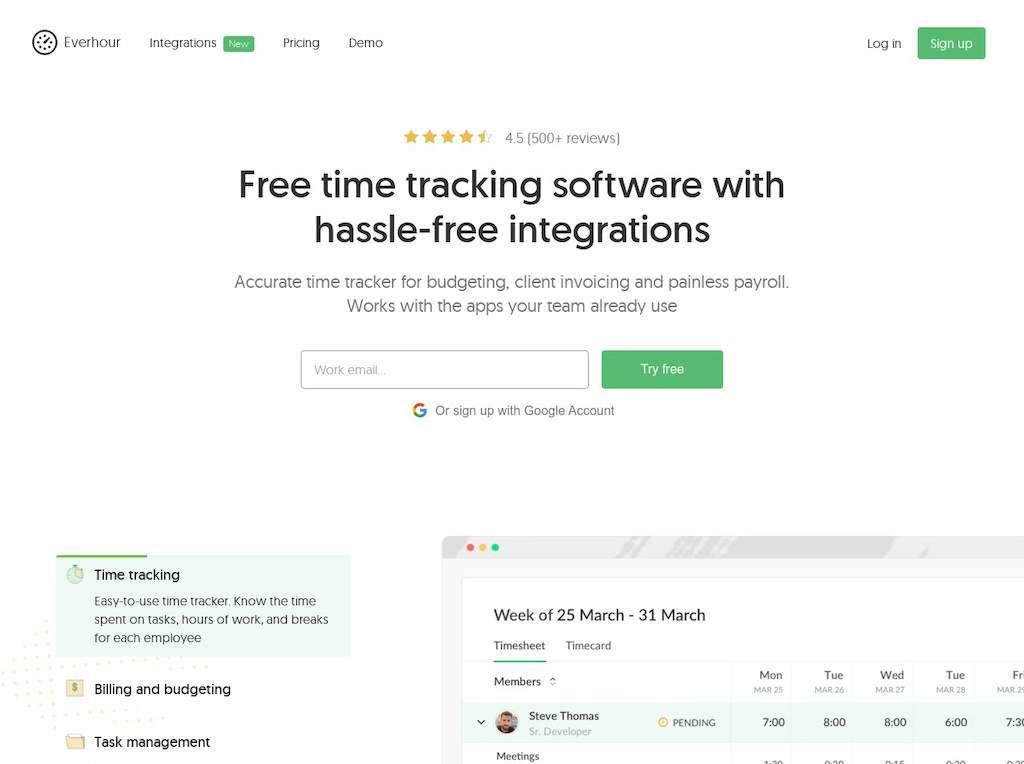
Everhour is a simple yet feature-filled, intuitive time tracker for job tracking. It is designed to help organizations manage their projects and time-tracking needs. It’s an effective and reliable tool for delegating tasks, making reports, and tracking time.
✨ Key features
- Time tracking: This is often regarded as one of the most important features of Everhour. As a timesheet app and an attendance tracker, it is useful for tracking time via the web app or installed browser extension. Track your employees’ activities and multiple projects simultaneously.
- Comprehensive reporting: Generating reports after a completed task and other events helps you make quality decisions moving forward. Reports also help you learn your organization’s weaknesses and strengths.
- Solid integrations: Everhour is better when you use it with your existing tools and applications. You can integrate Everhour with tools like Asana, Basecamp, Notion, etc., to boost efficiency.
- Project management: Live data, figures, and teams make up a project. Everhour helps you put all these under control via unique, straightforward project management.
- Invoicing: Everhour helps you create payment gateways and custom invoices. With Everhour, you can customize your invoices to reflect your client’s company, apply taxes and even generate invoices in your client’s native language. This gives you handy control over what goes in and out of your business.
🔧 Platforms
- Web app
- Browser extension
- iOS
💰 Pricing
- Free: $0
- Lite: The Lite plan costs $6 per month per user or $5 per month per user for the yearly subscription.
- Team: With this plan, you will pay $10 per month per user or $8.50 per month per user for the annual payment.
✅ Pros
- Great interface
- Smooth integration with numerous team management tools
- Detailed reports
- Easy to use
- Convenient project management
❌ Cons
- The mobile app needs improvement
Everhour is the top choice for small businesses and small to mid-size teams of 5 to 50 members, including professionals like software developers, marketers, designers, consultants, lawyers, you name it!
Seamlessly integrating with popular project management tools like Asana, Trello, and Jira, its user-friendly interface and customizable reports make it the ultimate time tracking solution for small and mid-size teams.
With dedicated support ensuring you receive timely assistance, our team is here to help you promptly and with a smile!
2. Monday.com – Best for technical teams
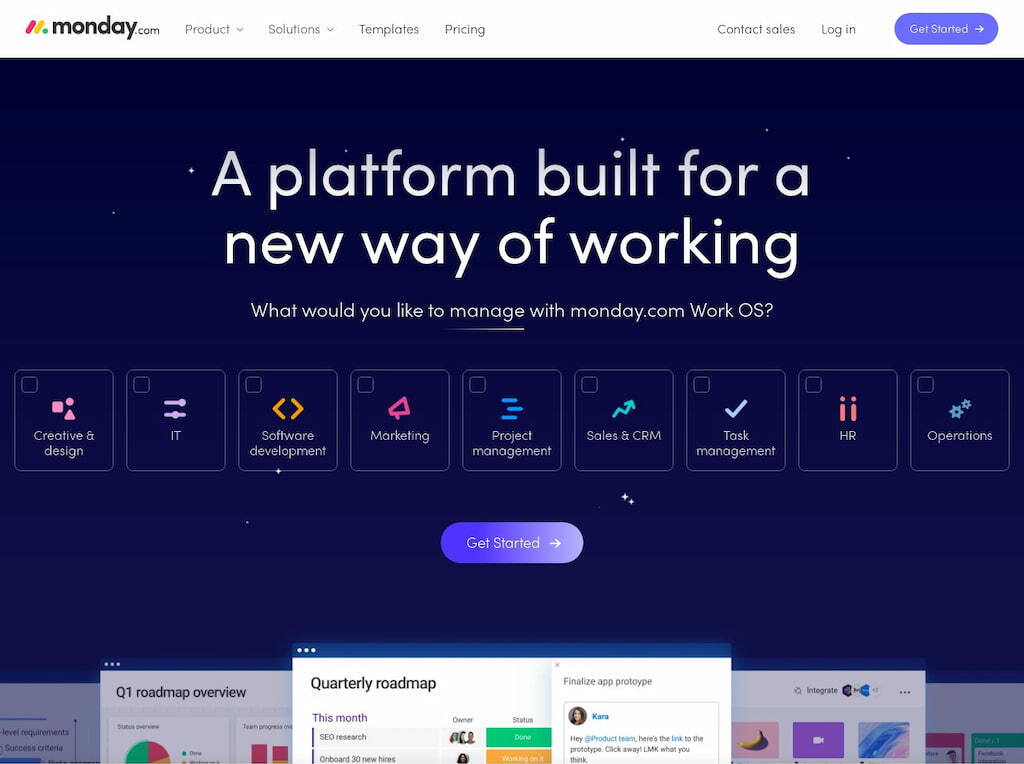
Monday.com is an exceptional project management tool with a flexible platform for all kinds of teams. It may seem intimidating initially, but the interface is smooth and offers extensive configuration and management capabilities. That’s why Monday.com tops the list of job-tracking apps for technical teams on all levels.
✨ Key features
- Integrations: As a modern job-tracking software, Monday.com gives you multiple integration options, including those for developers, marketing, etc.
- Pre-built automation: Pre-built automation gives you a wide range of options to create more tools for your business and the automation guidelines to follow.
🔧 Platforms
- Web app
- Android
- iOS
- Desktop app
💰 Pricing
- Individual: $0 for up to two users.
- Basic: $8 per user per month when you pay annually, or $10 per user per month for the monthly subscription, including free trials.
- Standard: $10 per user per month for the yearly subscription, or $12 per user per month when you pay monthly, and a free trial is available.
- Pro: $16 per user per month for the annual subscription, or $20 per user per month when you choose the monthly billing method, and it comes with a free trial.
- Enterprise: You can get quotes based on your request.
✅ Pros
- Smooth user interface
- Extensive features
- Robust customization
❌ Cons
- It can be stressful to use
- New users need time to get accustomed to some features
3. Teamwork – Best for time tracking and budgeting
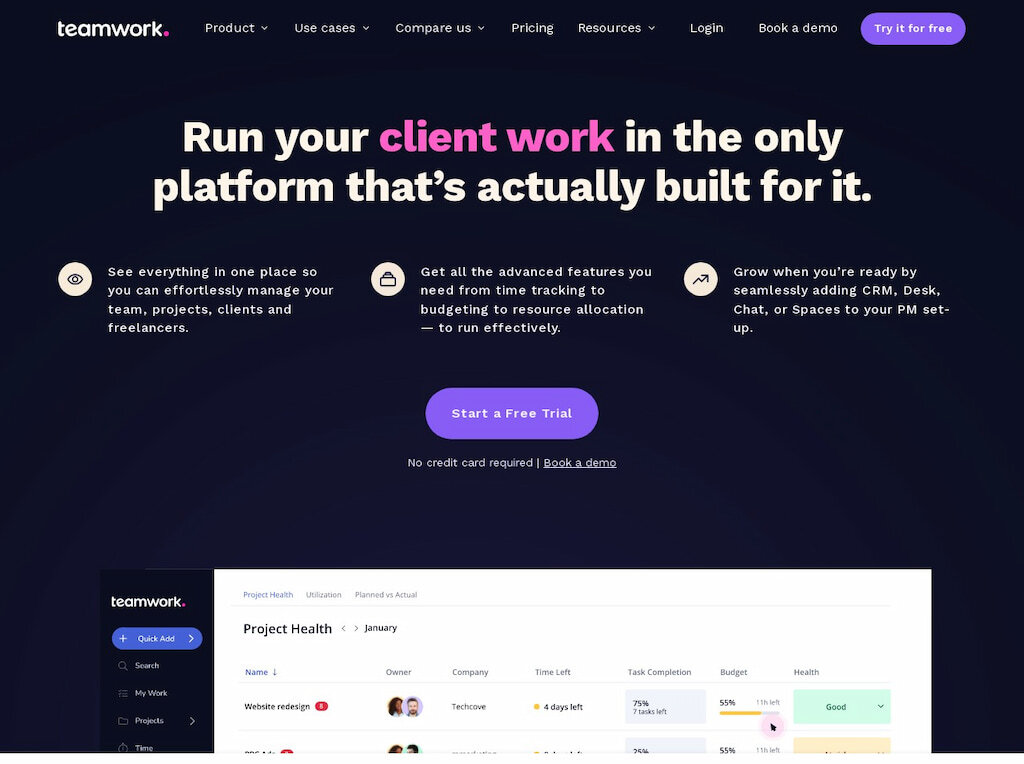
Teamwork is a job management software designed to enable teams to manage their tasks and workload. It also has a wide range of features you can count on to fit different aspects of your project, such as time tracking and budgeting.
✨ Key features
- Reporting: Users can build and generate reports of various project data to share through CSV, Excel, or PDF.
- Integrations: Using Teamwork alone as your time clock app takes the fun out. For this reason, the tool offers many integrations with popular platforms like Google Drive, HubSpot, Zapier, etc.
🔧 Platforms
- Browser extension
- Web app
- Desktop app
- iOS
- Android
💰 Pricing
- Free Forever: $0 per month for about five users.
- Starter Plan: $5.99 per user per month for the yearly payment. You can also opt for $8.99 per user per month when you pay monthly, including a free trial.
- Deliver Plan: $9.99 per user per month for the annual billing, or $13.99 per user per month for the monthly subscription, and a free trial is available.
- Grow Plan: This plan costs $17.99 per user per month for the annual billing or $24.99 per user per month for the monthly billing.
- Scale: Get a quote upon request.
✅ Pros
- Workload management capabilities
- Unlimited free plan
- Multiple features
❌ Cons
- Comprehensive features are only available on higher plans
- Customization seems tardy
4. Asana – Best for extensive projects
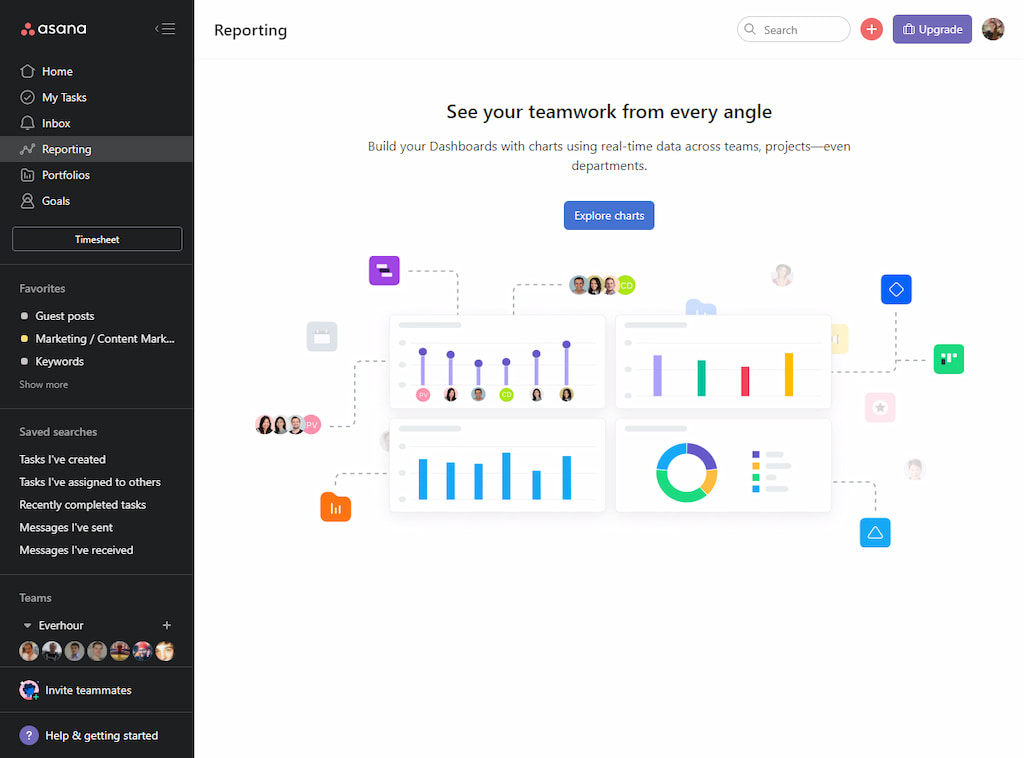
Asana stands out among the leading job-tracking systems and boasts extensibility that cuts across multiple business niches. So whether you want to view team member workloads or add strategic goals, Asana is flexible enough.
✨ Key features
- Project and task management: Get a good look at project data, custom fields, rules, and forms for your tasks.
- Time tracking: Enable the built-in tracking tool to see time spent on tasks.
🔧 Platforms
- Web app
- Android
- iOS
- Browser extension
- Desktop app
💰 Pricing
- Basic: $0 per user per month.
- Premium: $10.99 per user per month when you choose the annual billing, or $13.49 per user per month when you pay monthly.
- Business: Businesses will pay $24.99 per user per month when paid annually or $30.49 per user per month when you go for the monthly payment. All plans come with a 30-day free trial period.
✅ Pros
- Top-notch project management
- User-friendly interface and tools
❌ Cons
- It can be less intuitive
- Occasional lags and error messages
5. WebWork Time Tracker – Best for remote job tracking
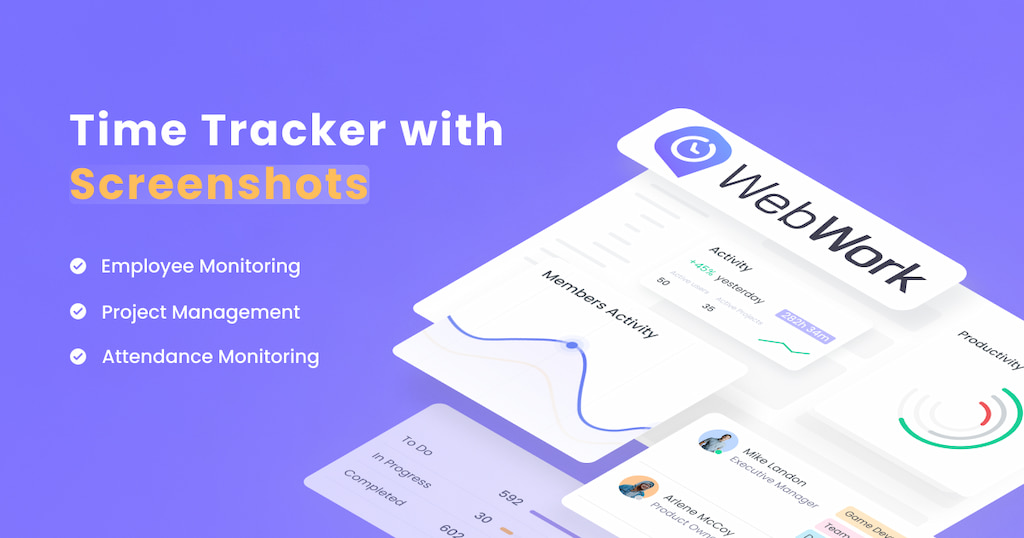
WebWork is a time-tracking and employee-monitoring tool aimed at remote teams. It helps monitor remote employees’ working hours and manage their work process easily. The tool tracks time, app and website usage, attendance, productivity, and activity level.
WebWork also has built-in task management and communication so that you can manage remote work in one platform.
✨Key features
- Automatic time tracking: Whenever your team members start work, WebWork starts tracking their time. That way you do not have to interfere in any way, as you will get detailed reports from WebWork.
- 4 screenshot modes: To make the remote work process transparent and easier to manage, WebWork offers 4 screenshot modes. With their help, you will always be aware of a project’s progress and your team’s work process. Whenever privacy is a priority, you can use the Blurred mode.
- Productivity tracking: In case you have worries about the productivity of your remote employees, WebWork takes care of that with productivity reports. It tracks their app and website usage, along with keyboard and mouse usage, and creates detailed reports for you.
🔧 Platforms
- Desktop app
- Web
- Mobile
- Chrome extension
💰 Pricing
- 14-day free trial
- Basic: $4.09 per user/month if paid annually, and $4.99 if paid monthly
- Enterprise: custom price for large teams
✅ Pros
- A large variety of employee monitoring and management features
- Integrates with many tools
- Simple pricing
❌ Cons
- No free plan
- May not be welcome by employees at first
6. Zoho Projects – Best for handling many project visualizations
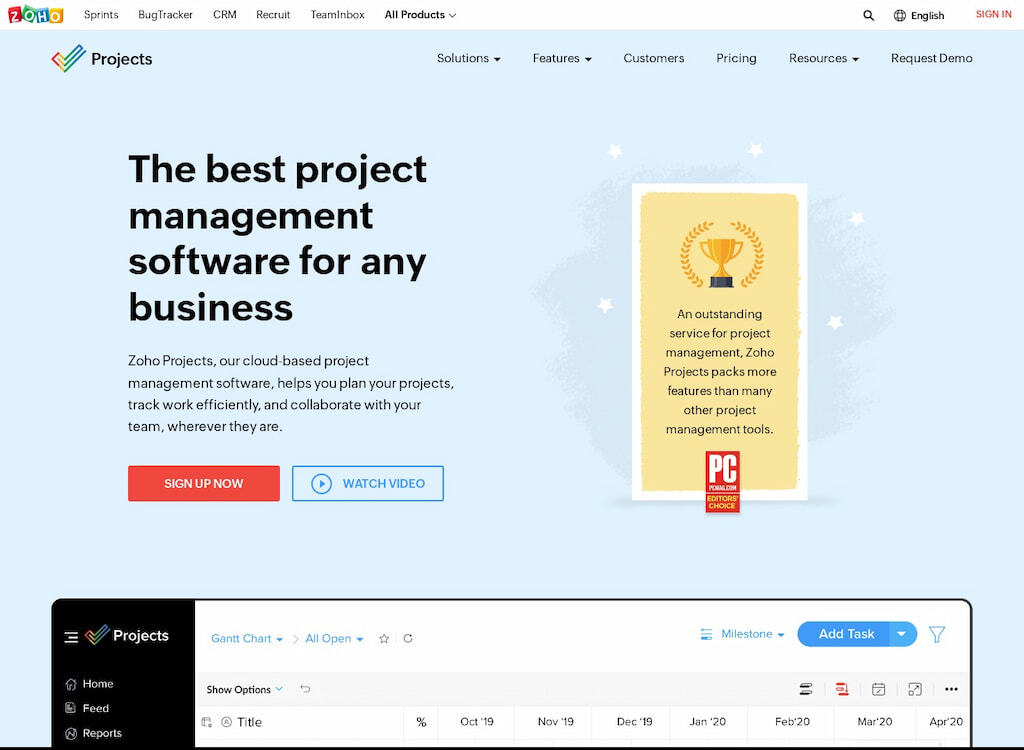
Zoho Projects has many features, with key attention to project visualization and management. With Zoho Projects, you can visualize and adjust project data through views like a traditional spreadsheet and Gantt chart in real-time. Such views and subsequent workflow can also be automated. Further, Zoho is one of the most affordable project management software around.
✨ Key features
- Project visualization: This app comes in handy, especially if you need a reliable tool to plan and cover every angle of your project data.
- Track time: This feature helps you keep track of your project to inform workload and resource management.
- Integrations: Zoho is built to combine with important apps from Google, Microsoft, and much more.
🔧 Platforms
- Web app
- Chrome extension
- Android
- iOS
- Desktop app
💰 Pricing
- Free: $0 for up to three users.
- Premium: $4 per user per month (for the annual payment) or $5 per user per month for the monthly payment. And a free trial is available.
- Enterprise: $9 per user per month when you pay yearly, or $10 per user per month for the monthly payment. A free trial is available.
✅ Pros
- Affordable service and subscription plans
- Robust features
- Smooth interface
❌ Cons
- Prone to lags between different platform pages
7. Wrike – Best for portfolio management
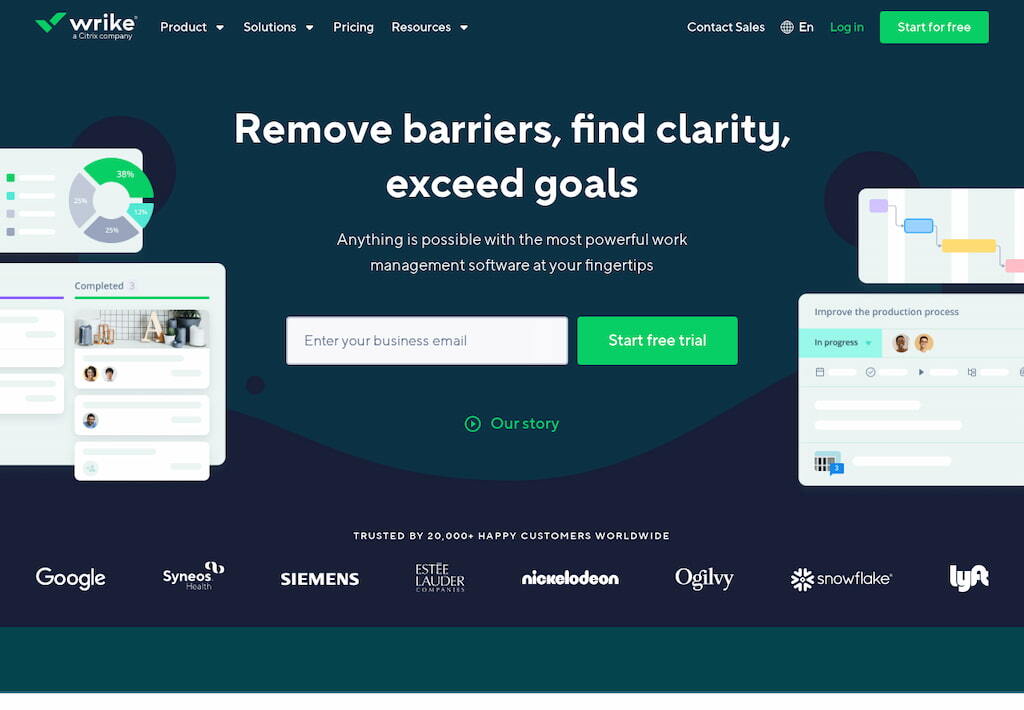
Wrike may be a subsidiary of Citrix, but it once held its place as a top choice among project management software. It can manage multiple project portfolios, however large. There’s also a wide-ranging feature set, such as custom request forms and invoicing.
✨ Key features
- Manage entire portfolios: Wrike gives you command over your projects via tools like tables, lists, boards, and Gantt charts.
- Project templates: This on-track software gives you access to multiple templates for agile, creative, IT operations, and project management office teams.
🔧 Platforms
- Web app
- Android
- iOS
- Desktop app
💰 Pricing
- Free: $0 per user per month
- Team: $9.80 per user per month
- Business: $24.80 per user per month
- Enterprise: Quote on request
- Pinnacle: Quote on request
✅ Pros
- Excellent for managing portfolios
- Extensive interoperability and workflow capabilities
- Enterprise-ready
❌ Cons
- It can be an expensive choice
- Some of the best features are available only on request
8. Jira Work Management – Best for development teams
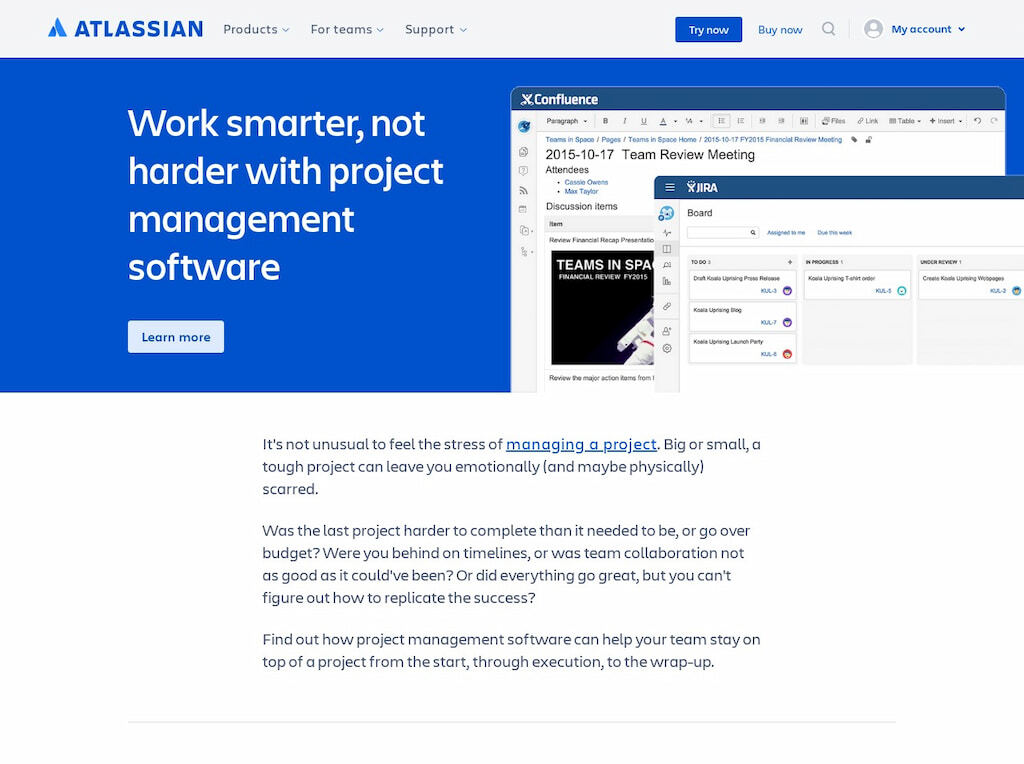
Jira is the project management software responsible for Atlassian’s collaboration, code management, and security solutions portfolio. Additionally, it is designed to provide a base for developer teams, thanks to a potent mix of project data views, employee time tracking, reporting, and configuration.
✨ Key features
- Project visualization: You can visualize your project data using list, board, timeline, and calendar views.
- Robust integrations: You can integrate Jira Work Management with other Atlassian tools and over 3,000 extensions for workflow apps.
🔧 Platforms
- Browser extension
- Web app
- Android
- iOS
💰 Pricing
- Free: $0 for up to 10 users.
- Standard: $5 for every user per month when you pay monthly, or a flat annual rate of $500 (depending on user account).
✅ Pros
- Built-in time-tracking tools
- Multiple integrations
❌ Cons
- Below par interface
9. Airtable – Best for granular controls
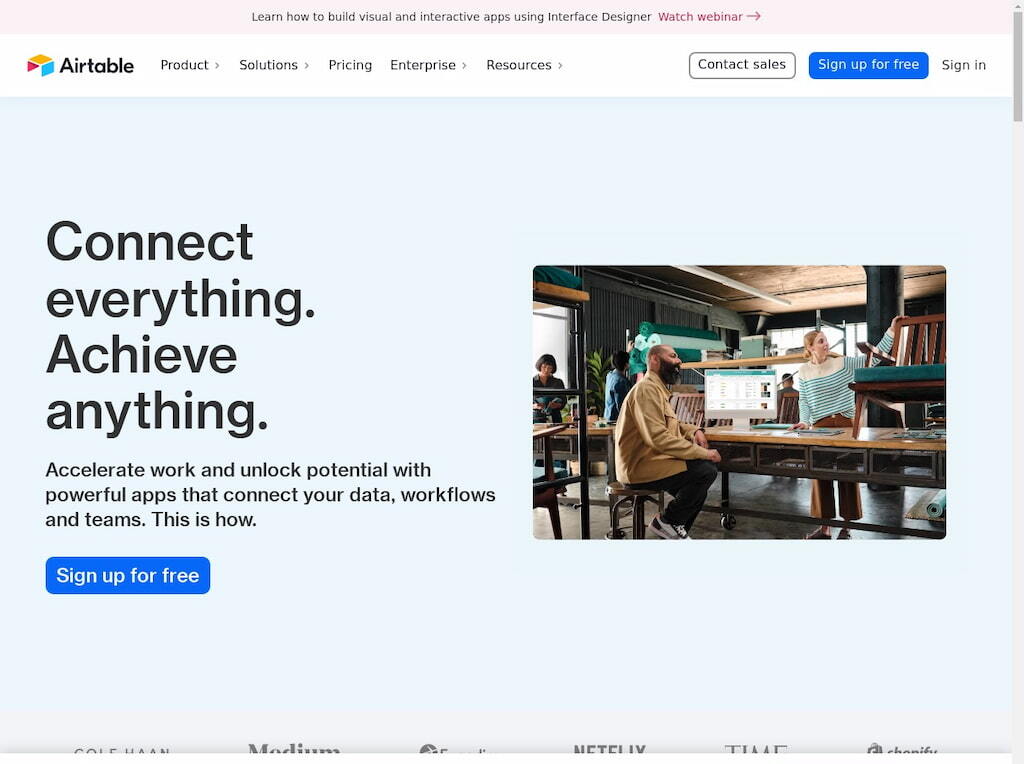
Airtable is a popular job-tracking app and has developed into a leading project management software solution. It is built for teams looking to connect their data and workflows to enhance process management.
✨ Key features
- Project visualization: You can use Airtable to visualize project data through a grid, Kanban, Gantt, and more.
- Custom automations: When you use Airtable as your time tracker, you can enjoy pre-built and custom process automation.
🔧 Platforms
- Desktop app
- Web app
- Android
- iOS
💰 Pricing
- Free: $0 for up to five creators or editors
- Plus: $10 per user per month when you choose to pay annually, or $12 per user per month for the monthly subscription. A free trial is available.
- Pro: $20 per user per month for the annual payment, or $24 per user per month when paid every month. And a free trial is available.
- Enterprise: Quote available on request.
✅ Pros
- Comfortable and intuitive user interface
- Seamless importing processes
❌ Cons
- Can lag occasionally
- Fewer enterprise integrations
10. Smartsheet – Best for organizing spreadsheets
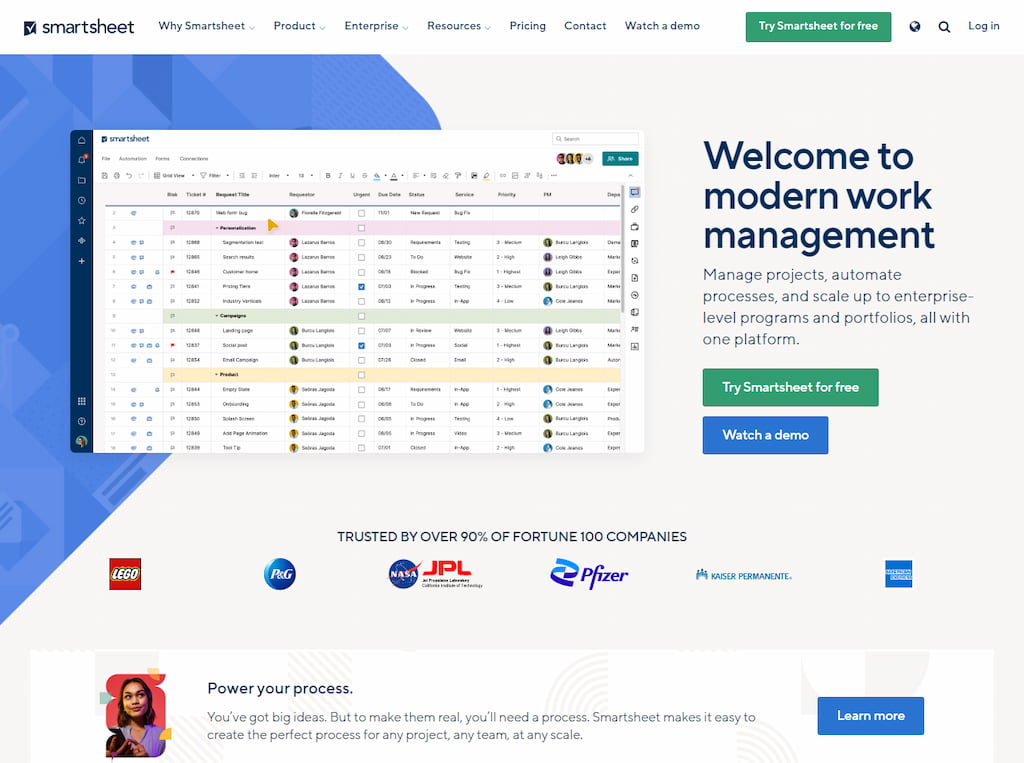
Smartsheet is a project and work management platform with easy-to-use features that offer an upgrade to traditional work tracking systems. It adds robust configurations and no-code capabilities to a spreadsheet interface.
✨ Key features
- Project visualization: Create, import, and manage project data.
- Tracking: Smartsheet has an activity log for tracking change management using filters to identify actions.
🔧 Platforms
- iOS
- Android
- Web app
- Browser extension
💰 Pricing
- Pro: $7 per team member per month for the annual billing, or $9 per team member per month for the monthly billing, coupled with a free trial.
- Business: The Business plan costs $25 per user per month when paid annually or $32 for every user when you choose to pay monthly. A free trial is also available.
- Enterprise: Quotes available on request
✅ Pros
- User-friendly interface
- Pre-built project and automation templates
❌ Cons
- Security stops at the Enterprise subscription
- Some tools are add-ons, so they require additional purchase
11. MeisterTask – Best for visual designs
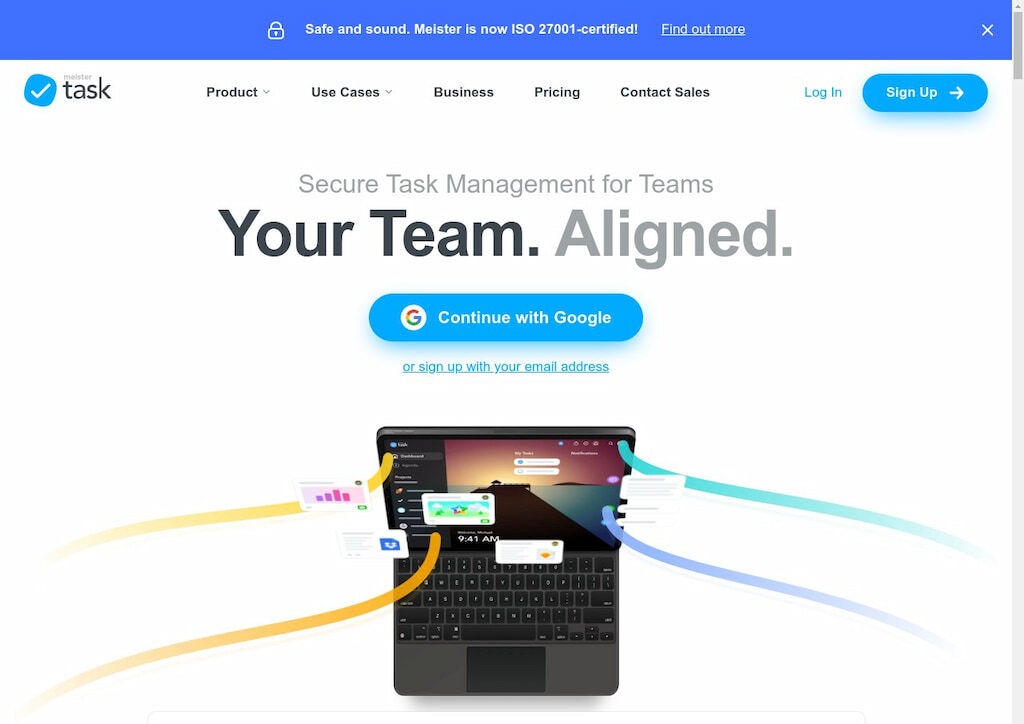
MeisterTask carries a powerful Kanban structure to facilitate smooth tracking and management of projects. There’s also a wide range of collaborative capabilities, including the chance to develop clean visual designs.
✨ Key features
- Scheduling: With task scheduling, monitoring activities and collaborating with teams from any location is easy.
- Personalized board: Pin and organize tasks from any project using your personal board.
🔧 Platforms
- Desktop app
- Web app
- iOS
- Android
💰 Pricing
- Basic: $0
- Pro: $8.25 per user per month ($4.19 per month when paid annually)
- Business: $20.75 per user per month ($10.39 per month when paid annually)
- Enterprise: Quotes based on request
✅ Pros
- Simple and comfortable collaborations
- First-of-its-kind personal board
- Intelligent automations
❌ Cons
- Often notifications arrive late on mobile devices
- No calendar function
12. LiquidPlanner – Best for schedule automation
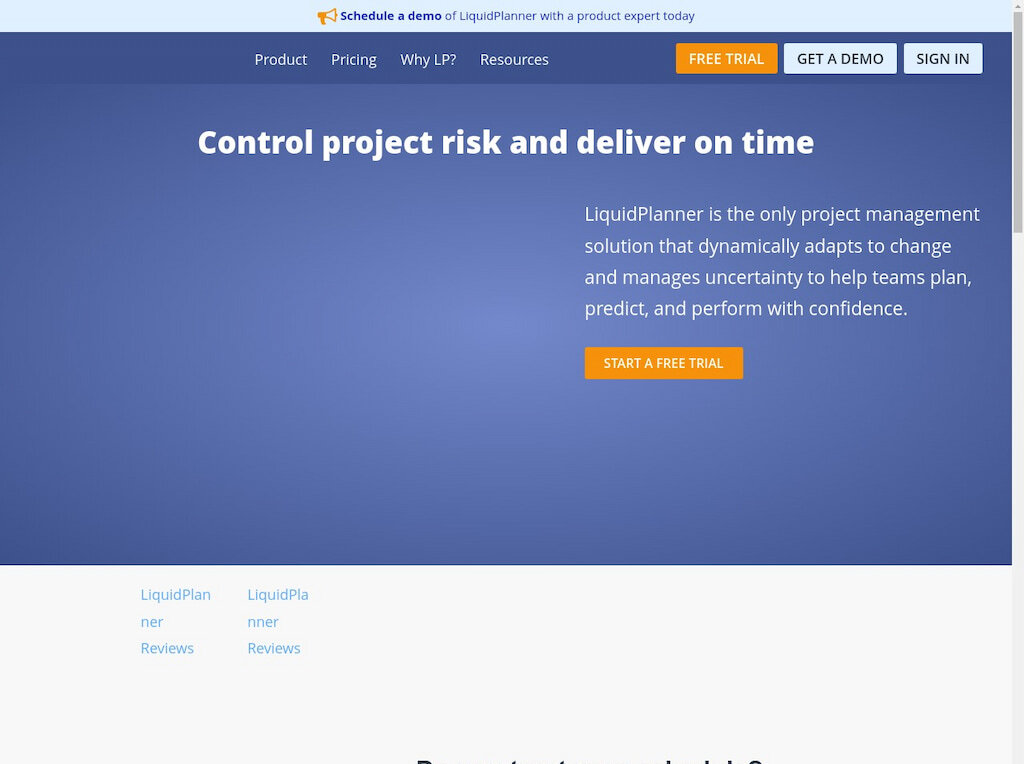
LiquidPlanner is a project management and on-track software designed to adapt to your business automatically. Also, it offers cross-project visibility with insights into progress, risks, and budgets for every single project simultaneously.
✨ Key features
- Activity tracking: Track your team and every process it takes to complete tasks and projects.
- Advanced analytics: LiquidPlanner uses this feature to help users manage project performance, check costs, and direct resources.
🔧 Platforms
- Web app
- Android
- iOS
💰 Pricing
- Free Plan: It can accommodate only 3 team members and ten projects
- Essentials: $15 per user per month (for the yearly payment)
- Professional: $39 per user per month (when you pay annually)
- Ultimate: $69 per user per month (for the annual billing)
✅ Pros
- Feature-rich
- Web and mobile accessibility
❌ Cons
- A bit pricey
13. SmartTask – Best for beginners
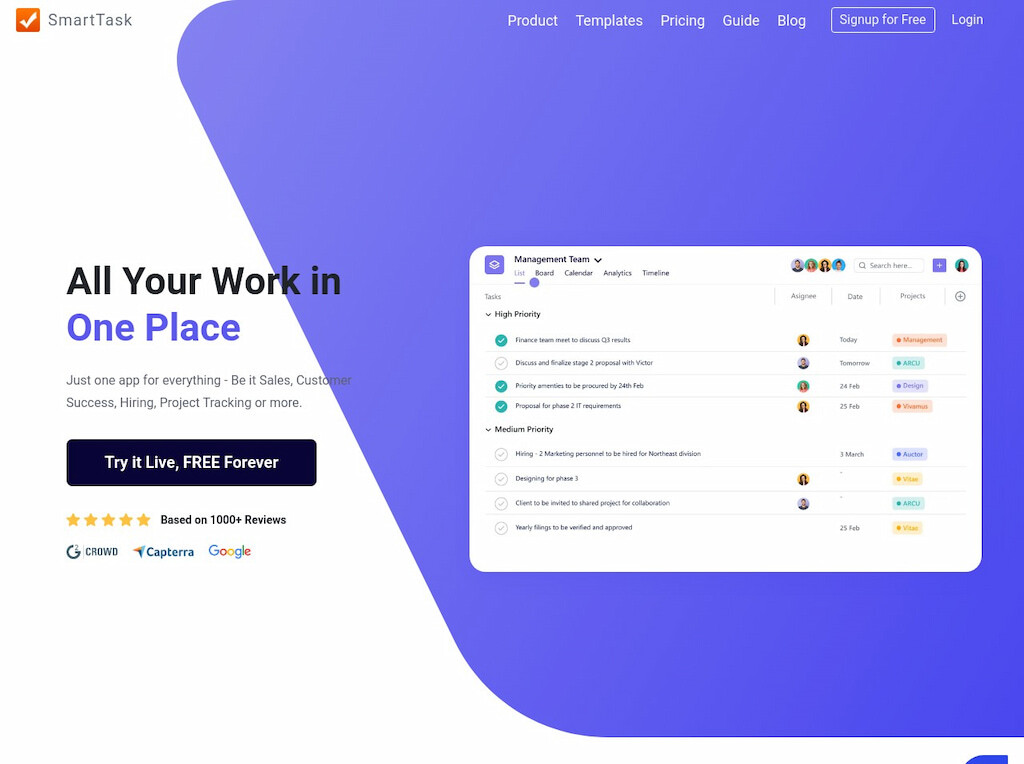
SmartTask is an online job management platform that helps small and large businesses organize and manage their work from one location. Among other benefits, it offers job tracking, time tracking, and collaboration features.
✨ Key features
- Task management: SmartTask lets you manage tasks with the list, board, calendar, and timeline views. Since it has portfolio capabilities, you can enjoy a hands-on experience with every project.
- Time tracking: This online tool helps you monitor tasks automatically and manually.
🔧 Platforms
- Web app
- Desktop app
- Android
- iOS
💰 Pricing
- Free Forever: $0
- Premium: $5 per user per month when you pay annually ($9 per user for monthly billing)
- Business: $8 per user per month when paid yearly ($14 per user for monthly billing)
✅ Pros
- You can start video conferences and voice calls from tasks
- Easy to use
❌ Cons
- Time tracking feature may fail
14. Zenhub – Best for automating repetitive tasks
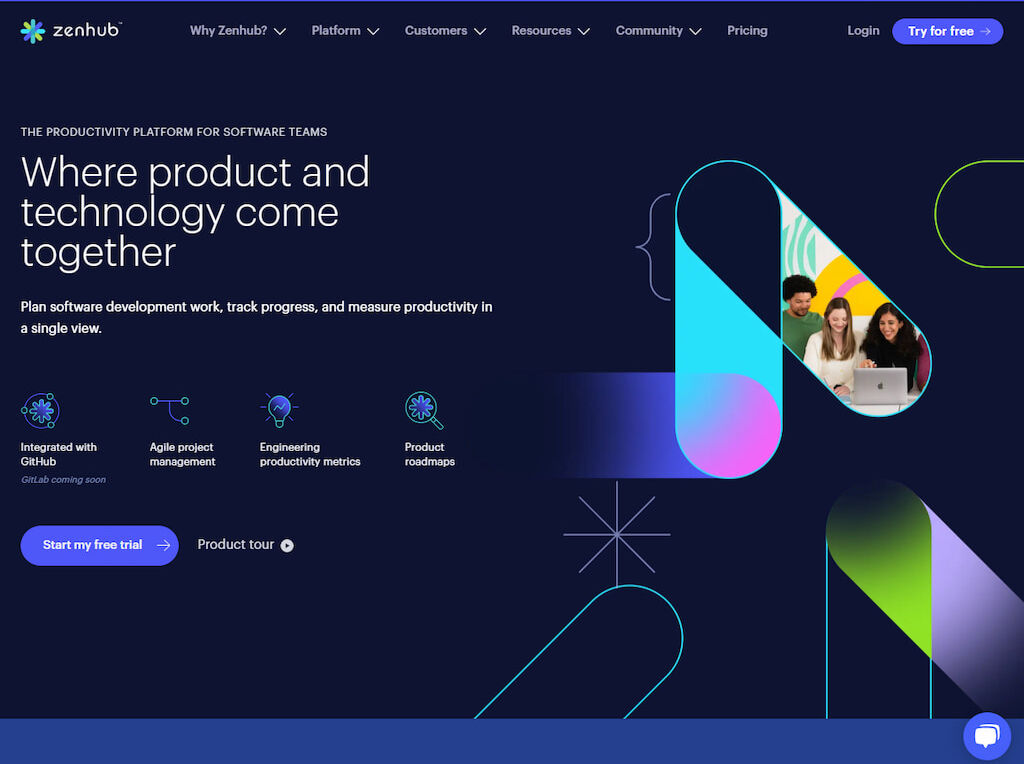
Zenhub is a good pick for various reasons, including its job tracking program to help teams get more work done faster. It comes with many tools and integrations, which offer a wide range of solutions and give Zenhub a unique advantage. That’s not all; this app is very compatible with GitHub, and many developers use them together.
✨ Key features
- Customization: After visualizing project data through boards and reports, you can create and modify team goals to achieve results.
- Automation: Zenhub lets you automate common workflows to reduce time spent on tasks and projects.
🔧 Platforms
- Browser extension
- Web app
💰 Pricing
- Free: $0
- Growth: $8.33 per user per month when paid annually, or $12.50 per user per month when paid monthly. This includes a free trial.
- Enterprise: Quote available on request, and a 30-day free trial is available for this plan.
✅ Pros
- It is a good fit for teams familiar with GitHub repositories.
- Clean user interface
❌ Cons
- Complicated for non-software development teams and project managers.
- Steep learning curve
- Limited to teams using GitHub
Comparison Table
| Free Plan | Invoicing | Native Time Tracking | Integrations | |
| Everhour | Yes | Yes | Yes | Yes |
| Monday.com | Yes | No | No | Yes |
| Teamwork | Yes | No | Yes | Yes |
| Asana | Yes | No | No | Yes |
| Webwork Tracker | No | Yes | Yes | Yes |
| Zoho Projects | Yes | No | Yes | Yes |
| Wrike | Yes | Yes | No | Yes |
| Jira | Yes | No | No | Yes |
| Airtable | Yes | No | No | Yes |
| Smartsheet | No | No | No | Yes |
| MeisterTask | Yes | No | Yes | Yes |
| LiquidPlanner | Yes | No | Yes | Yes |
| SmartTask | Yes | No | Yes | Yes |
| Zenhub | Yes | No | No | Yes |
Job Tracking Software: Conclusion
Running a business or organization without efficient job-tracking software is a significant gamble. While the apps discussed above offer valuable features, if you’re seeking extensive functionality at affordable rates, Everhour emerges as the optimal choice. With Everhour, employers and employees gain access to software that streamlines job tasks and projects, whether through time tracking, integrations, project management, invoicing, or advanced features. Teams can effectively manage timelines, resources, budgets, and other essential aspects, ensuring smoother operations and improved productivity.

